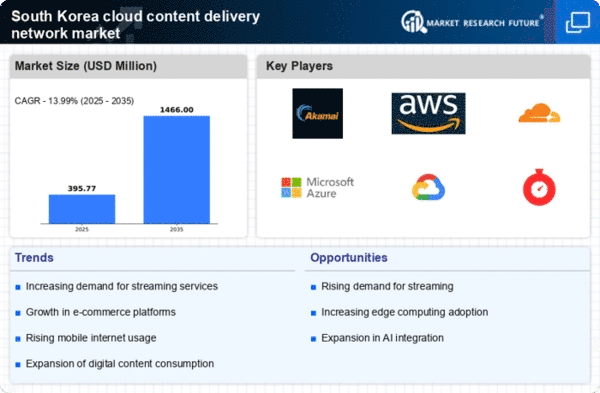E-commerce Growth
The rapid expansion of e-commerce in South Korea is significantly impacting the cloud content-delivery-network market. With online retail sales projected to reach over $100 billion by 2025, businesses are increasingly reliant on efficient content delivery systems to manage product information, images, and videos. The need for fast and reliable content delivery is paramount, as consumers expect quick load times and seamless browsing experiences. This trend compels e-commerce platforms to adopt advanced cloud content-delivery solutions to enhance their operational efficiency and customer satisfaction. As a result, the cloud content-delivery-network market is likely to see increased investments from e-commerce companies aiming to optimize their digital presence and improve service delivery.
Mobile Device Usage Surge
The surge in mobile device usage in South Korea is a key driver for the cloud content-delivery-network market. As of 2025, mobile internet users account for over 80% of the population, leading to a significant increase in mobile content consumption. This trend necessitates the deployment of cloud content-delivery networks that can efficiently serve mobile users with optimized content. Businesses are increasingly focusing on mobile-first strategies, which require robust content delivery solutions to ensure fast loading times and high-quality user experiences. The cloud content-delivery-network market is likely to benefit from this shift, as companies invest in technologies that cater to the growing mobile audience, thereby enhancing their competitive edge.
Rising Cybersecurity Concerns
As cybersecurity threats continue to escalate, the cloud content-delivery-network market is witnessing increased demand for secure content delivery solutions. South Korean businesses are becoming more aware of the potential risks associated with data breaches and cyberattacks. Consequently, there is a growing emphasis on implementing robust security measures within cloud content-delivery networks. Companies are investing in advanced encryption technologies and secure access protocols to protect sensitive information. This heightened focus on cybersecurity is likely to drive the adoption of cloud content-delivery solutions that prioritize security, thereby shaping the future landscape of the cloud content-delivery-network market in South Korea.
Increased Internet Penetration
The cloud content-delivery-network market in South Korea is experiencing growth due to the increasing penetration of high-speed internet. As of 2025, approximately 95% of households have access to broadband services, which facilitates the consumption of digital content. This widespread connectivity enables users to access streaming services, online gaming, and other bandwidth-intensive applications seamlessly. Consequently, businesses are investing in cloud content-delivery networks to enhance user experience and reduce latency. The demand for high-quality content delivery is likely to drive the market further, as companies seek to optimize their infrastructure to meet consumer expectations. The competitive landscape is evolving, with local and international players vying for market share, indicating a robust growth trajectory for the cloud content-delivery-network market in South Korea.
Government Initiatives for Digital Transformation
The South Korean government is actively promoting digital transformation across various sectors, which is positively influencing the cloud content-delivery-network market. Initiatives aimed at enhancing digital infrastructure and supporting technology adoption are expected to drive demand for cloud services. The government's investment in smart city projects and digital public services creates a favorable environment for cloud content-delivery networks to thrive. By 2025, government spending on digital infrastructure is projected to exceed $10 billion, indicating a strong commitment to fostering innovation. This supportive regulatory framework is likely to encourage businesses to adopt cloud content-delivery solutions, thereby propelling the growth of the cloud content-delivery-network market.
















